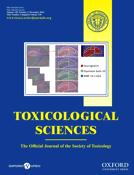
TOXICOLOGICAL SCIENCES
Scope & Guideline
Championing Excellence in Toxicological Research
Introduction
Aims and Scopes
- Mechanistic Toxicology:
Research that delves into the biochemical and molecular mechanisms by which toxic substances exert their effects on biological systems. - Risk Assessment and Safety Evaluation:
Studies aimed at evaluating the risks associated with exposure to toxic substances, including the development of predictive models and methodologies. - Comparative Toxicology:
Investigations that compare the toxic effects of substances across different species, which aids in understanding species-specific vulnerabilities and responses. - Innovative Testing Methods:
Development and validation of new in vitro and in vivo testing methodologies to assess toxicity and safety, including the use of advanced technologies like machine learning and organ-on-a-chip models. - Environmental Toxicology:
Research focusing on the effects of environmental pollutants on ecosystems and human health, including studies on bioaccumulation and ecological risk. - Pharmacokinetics and Metabolism:
Studies that explore how substances are absorbed, distributed, metabolized, and excreted in biological systems, contributing to the understanding of their toxic effects.
Trending and Emerging
- Nanotoxicology:
Research on the toxicological implications of nanomaterials is gaining prominence, reflecting the growing use of nanotechnology in various fields and the need to understand their health impacts. - Biomarkers of Exposure and Effect:
There is an increasing emphasis on identifying and validating biomarkers for assessing exposure to toxic substances and their effects, which aids in early detection and risk assessment. - Translational Toxicology:
Studies aimed at translating findings from basic toxicological research into clinical and regulatory applications are becoming increasingly important, bridging the gap between laboratory and real-world implications. - Microbiome and Toxicity Interactions:
Emerging research is focusing on the interactions between toxic substances and the microbiome, emphasizing the role of gut microbiota in mediating toxic effects and influencing health outcomes. - Machine Learning and Computational Toxicology:
The integration of machine learning and computational methods in toxicological research is on the rise, allowing for more efficient data analysis, predictive modeling, and risk assessment.
Declining or Waning
- Traditional Animal Models in Toxicology:
There has been a noticeable shift towards alternative models such as in vitro systems and computational approaches, leading to reduced emphasis on traditional animal studies. - Generalized Chemical Toxicity Studies:
Research focusing on broad-spectrum toxicity evaluations without specific mechanistic insights appears to be less prevalent, as there is an increasing demand for more targeted investigations. - Basic Toxicological Observations:
Publications that primarily report observational data without in-depth mechanistic analysis or implications for human health or environmental safety are becoming less common.
Similar Journals

TOXICOLOGY AND APPLIED PHARMACOLOGY
Unraveling the Complexities of Drug InteractionsTOXICOLOGY AND APPLIED PHARMACOLOGY, published by Academic Press, Inc. Elsevier Science, stands as a leading journal in the domains of toxicology and pharmacology, with its establishment dating back to 1959. With an impact factor reflecting its academic rigor and relevance, this journal is classified in the Q2 quartile for both pharmacology and toxicology categories, underscoring its significance in the scientific community. It ranks #34 out of 133 in Toxicology and #95 out of 313 in Pharmacology according to Scopus, placing it within the 74th and 69th percentiles, respectively. The journal aims to disseminate quality research that drives advancements in understanding the interactions of drugs and toxic substances within biological systems. Researchers and professionals are invited to contribute and engage with a broad spectrum of articles that cover mechanistic studies, risk assessment, and innovative therapeutic strategies. Although the journal does not offer open access, it continues to be a crucial resource for those who seek to navigate the complex interface of drugs and their toxicological implications.

Toxics
Fostering collaboration in the fight against toxins.Toxics is a leading international journal published by MDPI that has been dedicated to advancing the knowledge in the fields of toxicology, environmental health, and chemical safety since its inception in 2013. With an impressive Open Access model, it ensures that all research findings are readily available to a global audience, fostering collaboration and innovation across academia and industry. The journal is esteemed for its rigorous peer-review process and holds notable rankings, including Q1 status in Chemical Health and Safety and Q2 in both Health, Toxicology and Mutagenesis and Toxicology, reflecting its impact on critical research areas. Based in Basel, Switzerland, Toxics provides a platform for researchers, professionals, and students to disseminate significant findings on the implications of toxic substances in health and the environment, aiming to improve public health outcomes and inform regulatory decisions. With its ongoing commitment to high-quality research and relevant access options, Toxics continues to be an essential resource in the domain of toxicology and environmental sciences.
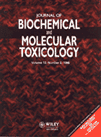
JOURNAL OF BIOCHEMICAL AND MOLECULAR TOXICOLOGY
Advancing the Frontiers of Toxicology and BiochemistryJournal of Biochemical and Molecular Toxicology, published by Wiley, plays a pivotal role in the advancement of knowledge within the fields of biochemistry, toxicology, and molecular biology. Established in 1998, this esteemed journal has garnered a significant reputation, evidenced by its current placement in the Q2 quartile across several categories, including Biochemistry, Health, Toxicology and Mutagenesis, and Medicine. With an ISSN of 1095-6670 and an E-ISSN of 1099-0461, it serves an international audience, offering critical insights and innovative research that shape our understanding of biochemical interactions and toxicological assessments. While it does not operate on an open-access model, the journal ensures rigorous peer review and high-quality publication standards, making it a valuable resource for researchers, professionals, and students dedicated to the exploration of molecular toxicology. The journal's recognized impact within the scientific community is reflected in its competitive rankings among specialized journals, fostering significant contributions to both academic and applied contexts.
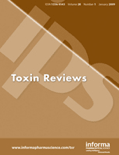
Toxin Reviews
Advancing the Science of ToxicologyToxin Reviews is a premier academic journal focused on the critical field of Toxicology, published by Taylor & Francis Inc. Established with an aim to foster research and disseminate knowledge, this journal has been pivotal since its inception in 1982 and continues to be a leading platform for both emerging and established researchers. With an impressive impact factor and ranked in the 75th percentile among its peers in the Scopus categories, it serves as an essential resource for scientists, practitioners, and students interested in understanding the complexities of toxins and their effects on health. The journal provides an Open Access platform, enhancing visibility and accessibility of research findings to a broader audience. Covering a wide scope, Toxin Reviews plays a vital role in bridging gaps between toxicological research and practical applications, ensuring that rigorous scientific inquiry translates into real-world solutions.

TOXICOLOGY
Elevating research in toxicology to safeguard public health.TOXICOLOGY, published by Elsevier Ireland Ltd, is a prestigious peer-reviewed journal specializing in the field of toxicology. With an ISSN of 0300-483X and an E-ISSN of 1879-3185, this journal provides a vital platform for researchers, professionals, and students to disseminate and access groundbreaking studies from 1973 to present, with a convergence set until 2024. Recognized for its high impact, it holds a Q1 ranking in Toxicology category and ranks #18 out of 133 in Scopus's sector of Pharmacology, Toxicology, and Pharmaceutics, placing it in the 86th percentile. While the journal is not open access, it nonetheless offers a rich collection of research articles that enhance the understanding of toxicological science and its applications. The journal's objectives encompass advancing knowledge in the toxicological evaluation of substances, promoting safety in public health, and fostering dialogue among scholars. As a key resource in the field, TOXICOLOGY plays a crucial role in advancing research and informing practices related to toxicological risks and safety assessments.

Toxicological Research
Innovating research to unveil the mysteries of toxicology.Toxicological Research is a prominent academic journal dedicated to advancing the field of toxicology through rigorous exploration and innovative research. Published by the Korean Society of Toxicology, this journal serves as a vital resource for researchers, professionals, and students engaged in environmental science, pharmacology, and toxicology. With an ISSN of 1976-8257 and an E-ISSN of 2234-2753, Toxicological Research highlights significant findings and discussions in the realm of health, toxicology, and mutagenesis. Although not an open-access journal, it maintains a solid reputation as evidenced by its Q3 ranking in both health-related toxicology and general toxicology categories for 2023. The journal covers a broad spectrum of topics from fundamental research to applied toxicology and provides a unique platform for the dissemination of knowledge in a field that is increasingly relevant in today’s society. With an anticipated convergence period from 2008 to 2024, Toxicological Research continues to contribute vital insights to understanding the implications of toxic substances on health and the environment.
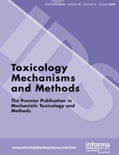
TOXICOLOGY MECHANISMS AND METHODS
Leading the charge in toxicology advancements globally.TOXICOLOGY MECHANISMS AND METHODS is a distinguished peer-reviewed journal dedicated to the advancement of toxicological research, published by Taylor & Francis Ltd. With its ISSN 1537-6516 and E-ISSN 1537-6524, this esteemed journal features critical studies and innovative methodologies in the field of toxicology, aligning with its mission to enhance understanding of biological mechanisms and risk assessment. The journal holds a commendable Q2 ranking in both the Health, Toxicology and Mutagenesis, and Toxicology categories, as well as strong positions in Scopus rankings, reflecting its influence with a 71st percentile rank in Toxicology and a 69th percentile rank in Environmental Health. Researchers, professionals, and students in the toxicology domain will find this journal to be an invaluable resource, offering open access options that foster widespread dissemination of its findings. Since its inception, encompassing converged years from 1991 to 1995 and from 2002 to 2024, the journal remains at the forefront of critical discourse and innovative research methods, making it a vital platform for advancing toxicological science globally.

Current Research in Toxicology
Exploring the Frontiers of Toxicology ScienceCurrent Research in Toxicology is a pioneering journal published by ELSEVIER that serves as a vital platform for disseminating cutting-edge research in the field of toxicology, spanning from biological impacts to pharmacological applications. With an ISSN of 2666-027X and an impressive Q2 ranking in key categories such as Applied Microbiology and Biotechnology, Health, Toxicology and Mutagenesis, and Toxicology, this journal underscores its commitment to high-quality research and significant contributions to the scientific community. Based in the Netherlands, Current Research in Toxicology aims to bridge the gap between academia and industry by providing rigorously peer-reviewed articles that cover a wide array of topics including novel methodologies, regulatory challenges, and emerging trends within the domain. The journal is accessible through various platforms, making it essential for researchers, professionals, and students eager to stay updated on the latest findings and advancements in toxicology. With a comprehensive focus on integrating theory with practical application, this journal is poised to influence future studies and policies in health and environmental science.

Molecular & Cellular Toxicology
Decoding cellular mechanisms in the realm of toxicology.Molecular & Cellular Toxicology, published by the Korean Society Toxicogenomics & Toxicoproteomics (KSTT), is a significant journal in the field of toxicology, providing crucial insights into molecular mechanisms underlying toxic responses. With an ISSN of 1738-642X and E-ISSN 2092-8467, this journal serves as a vital platform for researchers, professionals, and students interested in the latest findings and advancements in toxicology, health, and environmental science. Although it operates under a subscription model, it maintains rigorous peer review standards, contributing to its respectable Q3 classification in Health, Toxicology and Mutagenesis, and its Q2 standing in Pharmacology, Toxicology, and Pharmaceutics. The journal, intersecting with innovative aspects of pharmacology and public health, aims to foster a deeper understanding of toxicological impacts on cellular processes and overall health. Located in Germany and supported by a dedicated editorial board, Molecular & Cellular Toxicology stands out in the academic community, encouraging interdisciplinary discourse and collaboration to address critical toxicological challenges. Engage with us for cutting-edge research that informs and shapes the future of toxicological science.
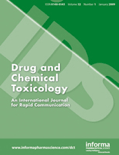
DRUG AND CHEMICAL TOXICOLOGY
Illuminating the path to chemical health and safety.Drug and Chemical Toxicology is a well-respected journal in the fields of toxicology, pharmacology, and public health, published by Taylor & Francis Ltd. Since its inception in 1978, this journal has diligently explored the effects and mechanisms of chemical exposures on health and the environment, fulfilling a crucial role in advancing scientific understanding and safeguarding public health. The journal is indexed across prestigious databases and features an impressive array of articles categorized within the Q2 and Q3 quartiles across various categories in 2023, reflecting its significance in Chemical Health and Safety as well as Environmental and Occupational Health disciplines. With an extensive reach and a focus on interdisciplinary research, Drug and Chemical Toxicology offers a rich repository of original research, reviews, and methodological advancements, catering to a diverse audience of researchers, professionals, and students dedicated to the betterment of safety and health standards. Although not an open-access publication, its articles are widely accessible to the academic community, ensuring that critical innovations and insights are shared for the greater good.